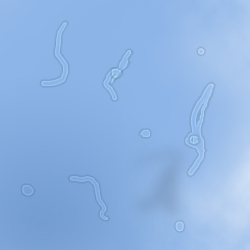If you look up at the sky on a clear day, you may see tiny cobweb-like structures drifting across your field of vision. They are known as floaters or formally muscae volitantes – Latin for flying flies.
Like ordinary flies, mosquito volunteers are very complex, so it is not surprising that people want to destroy them. In a recent article photo“Eye Floaters: What Causes Them and How to Get Rid of Them Naturally”, claims to have a solution.
GP Sarah Brewer is quoted in the article as saying that a supplement called Clearer, developed by Thea Bayou, is “a natural yet effective solution to target pesky floaters”. Despite the promise in the title, Dr. Brewer isn’t talking about getting rid of floaters.
The Theia Bio website uses very precise language. “Clearer contains a combination of antioxidants and anti-glaciation micronutrients that have been scientifically proven to reduce the amount of eye floaters and visual discomfort in approximately 70 percent of test subjects within six months,” it says.
Before we look at supplement possibilities to “remove” annoying floaters or reduce their size, let’s look at what floaters are and why they happen.
The main cause of floaters is age. As we age, the vitreous—a clear, gel-like substance inside the eye—begins to thicken and thin. Vitreous contains a lot of water, collagen, and an acid called hyaluronan. Over time, the vitreous degrades a bit, and small pieces of collagen begin to form. Floaters are the shadows that these clumps cast on the retina.

As we age, it’s normal for the vitreous to pull away from the back of the eye, a process called posterior vitreous detachment, and this leads to more floaters.
Is it possible that vitamin supplementation to improve vitreous could affect collagen clumps and strands?
In 2022, researchers in Taiwan reported that high-dose mixed fruit enzyme supplements could reduce floaters, but it’s unclear how they measured the number of floaters, so it’s hard to base this study on without more data. Judge correctly.
Tia Bio, the company Dr. Brewer was speaking with, shares a link to a study on its website as scientific proof that Clarir supplements can “reduce the amount of eye floaters and visual discomfort”.
But floaters are difficult to measure because the vitreous is mobile. Every time you move your eye, the vitreous opacity (the floating object in the vitreous) moves, and the floaters—the shadows that the vitreous opacity casts—also move.
Vitreous clumps are 3D, not 2D, so holding them from different angles affects the amount you get, and floaters look bigger when they’re closer to the front of your eye. The reduction in opacity in the study is based on only 26 people who took the formula, and the opacity is reported in 2D measurements (cm²).
This small trial does not convince me that the amount of floaters can be reduced with this dietary supplement.
What about other solutions?
There are a few medical ways to get rid of floaters. The most widely accepted procedure is called a vitrectomy, which surgically removes the vitreous. But this surgery poses risks to a person’s vision that are more significant than the floaters themselves.
Zapping the floater with a laser (known as a YAG laser) is another option, but not all experts agree it’s safe. Unfortunately, many private companies offer this treatment as a good solution, although there are reports of damage to various eye structures and glaucoma.
Other “solutions” offered online include intermittent fasting, temple massage, and acupressure, as well as eye exercises. But there is no reliable evidence for this.
There is some evidence that lifestyle factors can speed up or slow down eye aging in general, which may affect the age at which you first notice floaters, or how big or troublesome they are.
For example, eating lots of vegetables rich in carotenoids (spinach, broccoli, watermelon, cauliflower) and oily fish containing omega-3 may help reduce the risk of age-related macular degeneration.
Emerging evidence also suggests that overexposure to blue light from cell phones, tablet computers, and LCD screens may accelerate age-related eye changes. But while slowing down aging in the eyes would be great, it’s not proof that it will stop people from getting floaters.

So what should you do if you find yourself being harassed by floaters? Often, the best thing to do is ignore them. Over time, the brain adapts, and we notice it less and less.
If you have low vision, have had cataract surgery, or if you have eye inflammation (inflammation), you are more likely to have floaters. And you may have more floaters if you have diabetes, so glucose and diabetes control are important.
Sometimes, floaters can be a sign of a serious condition. If you suddenly see a lot of new floaters or flashes, or if a shadow or gray screen appears in your vision, this may indicate a retinal tear that requires emergency surgery.
decision
Can supplements “address” collagen clumps in the vitreous? There is currently little evidence to support this.
Can supplements and lifestyle changes slow the aging process in the eye, delaying the onset of these age-related floaters? possibly
Dr. Brewer makes great recommendations about nutritious food, hydration, and sleep—all great ways to maintain your health. It is doubtful that this will have a direct effect on floaters, but it is generally very good health advice and may delay the aging process in the eye that causes them.
Tia Bio founder Kava Wang told the interview that his company “does not promise a cure for eye floaters; rather, it offers optimal nutritional support for eye floaters patients based on available scientific evidence”.![]()
Charlotte Codina, Lecturer, Orthoptics, University of Sheffield
This article is republished from The Conversation under a Creative Commons license. Read the original article.
An earlier version of this article was published in July 2023.
#supplement #control #pesky #eye #floaters